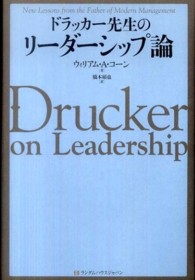- ホーム
- > 洋書
- > 英文書
- > Nature / Ecology
Full Description
A vital resource for sustainability educators and decision-makers.
In this ground-breaking book, leading sustainability educators are joined by permaculturists, literary critics, ecologists, artists, journalists, engineers, mathematicians and philosophers in a deep reflection on the skills that people need to survive and thrive in the challenging conditions of the 21st century. Responding to the threats of climate change, peak oil, resource deletion, economic uncertainty and energy insecurity demands the utmost in creativity, ingenuity and new ways of thinking in order to reinvent self and society. Among the many skills, attributes and values described in this volume are values reflection, coping with complexity, permaculture design, transition skills, advertising awareness, effortless action, and ecological intelligence, each accompanied by ideas for active learning exercises to help develop the skill. Far from being a rigid or definitive statement of the ‘one right way’ however, the handbook is exploratory, aiming to open up new, unthought-of paths, possibilities and choices. It is intended primarily for educators across the spectrum from higher education to informal education, but is also suitable for learners themselves and anyone interested in the literally ‘vital’ issue of the skills we need to survive and thrive in the 21st century and build a more sustainable future. Contributors include John Naish, Satish Kumar, Patrick Whitefield, John Blewitt, Stephan Harding and Stephen Sterling.
Contents
Acknowledgements.
Introduction by Arran Stibbe and Heather Luna.
Part 1 Skills for a Changing World.
Ecocriticism: the ability to investigate cultural artefacts from an ecological perspective – by Greg Garrard.
Optimisation: the art of personal sufficiency – by John Naish.
Grounded Economic Awareness: economic awareness based on ecological and ethical values – by Satish Kumar.
Advertising Awareness: the ability to expose advertising discourses that undermine sustainability, and resist them – by Arran Stibbe.
Transition Skills: skills for transition to a post-fossil-fuel age – by Stephen Quilley.
Commons Thinking: the ability to envisage and enable a viable future through connected action – by Justin Kenrick.
Effortless Action: the ability to fulfil human needs effortlessly through working with nature – by Ling Feng.
Permaculture Design: designing our lives with nature as the model – by Patrick Whitefield.
Community Gardening: skills for building community and working within environmental limits – by Alma Clavin.
Ecological Intelligence: viewing the world relationally – by Stephen Sterling.
Systems Thinking: the ability to recognise and analyse the interconnections within and between systems – by Glenn Strachan.
Gaia Awareness: awareness of the animate qualities of the Earth – by Stephan Harding.
Futures Thinking: the ability to envision scenarios of a more desirable future – by Sue Wayman.
Values Reflection and the Earth Charter: the ability to critique the values of an unsustainable society and consider alternatives – by Jeffrey Newman.
Social Conscience: the ability to reflect on deeply held opinions about social justice and sustainability – by Myshele Goldberg.
New Media Literacy: communication skills for sustainability – by John Blewitt.
Cultural Literacy: understanding and respect for the cultural aspects of sustainability – by Kim Polistina.
Carbon Capability: understanding climate change and reducing emissions – by Lorraine Whitmarsh, Saffron O’Neill, Gill Seyfang and Irene Lorenzoni.
Greening Business: the ability to drive environmental and sustainability improvements in the workplace – by Zoe Robinson.
Materials Awareness: the ability to expose the hidden impact of materials on sustainability – by Melinda Watson.
Appropriate Technology and Appropriate Design: the ability to design systems, technologies and equipment in an appropriate way – by Mike Clifford.
Technology Appraisal: the ability to evaluate technological innovation – by Gavin Harper.
Complexity, Systems Thinking and Practice: skills and techniques for managing complex systems – by Dick Morris and Stephen Martin.
Coping with Complexity: the ability to manage complex sustainability problems – by Bland Tomkinson.
Emotional Well-being: the ability to research and reflect on the roots of emotional well-being – by Morgan Phillips.
Finding Meaning without Consuming: the ability to experience meaning, purpose and satisfaction through non-material wealth – by Paul Maiteny.
Being-in-the-World: the ability the think about the self in interconnection and interdependence with the surrounding world – by John Danvers.
Beauty as a Way of Knowing: the redemption of knowing through the experience of beauty – by Barry Bignell.
Part 2 Educational Transformation for Sustainability Literacy.
Citizen Engagement – by Geoff Fagan.
Re-educating the Person – by Karen Blincoe.
Institutional Transformation – by Anne Phillips.
A Learning Society – by Kate Davies.






